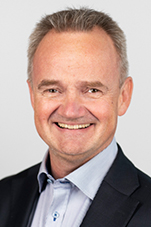Corporate Banking
Thanks to our clear-cut local presence with 61 branches and our head office in the region, and employees that are part and parcel of our local communities, SpareBank 1 SMN has stood by businesses in Central Norway through another crisis. With more customers at year-end than prior to the Covid-19 pandemic, 15,000 corporate clients and 11,000 accounting clients now have access to banking and accounting services under the same roof in the region’s leading finance house.
With almost 200 years of service behind it, and as the region’s leading finance house, SpareBank 1 SMN holds a position that carries an obligation. As in previous crises, the strategy this time this time too has been to keep a cool head.
 “2020 has been a brutal year for business and industry in Central Norway. We have never lost our focus on what is decidedly most important for us – to stand by our customers through an extremely demanding period for many businesses. Where competitors pull back, we maintain our belief in businesses and local communities. This is a stance that we resolutely bring with us into 2021.” These are the words of Vegard Helland, executive director of Corporate Banking and Arne Nypan, managing director at SpareBank 1 Regnskapshuset SMN.
“2020 has been a brutal year for business and industry in Central Norway. We have never lost our focus on what is decidedly most important for us – to stand by our customers through an extremely demanding period for many businesses. Where competitors pull back, we maintain our belief in businesses and local communities. This is a stance that we resolutely bring with us into 2021.” These are the words of Vegard Helland, executive director of Corporate Banking and Arne Nypan, managing director at SpareBank 1 Regnskapshuset SMN.
They have both turned the crisis to account to bring in more customers. Over the course of 2020 the group recruited 1,444 new businesses as banking clients and 641 new businesses as accounting clients.
Lending to businesses in Central Norway increased in 2020 by NOK 5.6bn. SpareBank 1 SMN was the first bank in the country to grant loans through the government loan guarantee scheme, and during the year just over NOK 500m was granted by this means. SpareBank 1 Regnskapshuset SMN has in addition provided customers with guidance and assistance in applying for support or compensation from the government authorities.
A complete finance house
At SpareBank 1 SMN, businesses in Central Norway have access to all manner of financial expertise, products and services they require. All subsidiaries and business lines were linked far closer together in 2022 to make life simpler for Central Norwegian corporate clients.
 “The group’s just over 1,600 employees possess competence and experience that benefit our customers. And now we are organising our business with a basis in the customer’s needs. When you contact a member of SpareBank 1 SMN’s staff, you gain access to all manner of services in banking, finance, estate agency and accounting”, says Arne Nypan, managing director at SpareBank 1 Regnskapshuset SMN.
“The group’s just over 1,600 employees possess competence and experience that benefit our customers. And now we are organising our business with a basis in the customer’s needs. When you contact a member of SpareBank 1 SMN’s staff, you gain access to all manner of services in banking, finance, estate agency and accounting”, says Arne Nypan, managing director at SpareBank 1 Regnskapshuset SMN.
Since its establishment, Regnskapshuset has developed into one of the country’s largest providers of accounting services. Since 2007 alone, more than 50 local accounting firms have been acquired. This now assures the company’s presence from Rørvik in the north to Lillehammer in the south. Following three further purchases made in 2020, the strategy is now to a greater degree one of organic growth.
SpareBank 1 Markets, SpareBank 1 Kapitalforvaltning and SpareBank 1 Finans Midt-Norge – along with banking, accounting and estate agency services – make SpareBank 1 SMN a complete finance house.
Sustainability as a competitive advantage
In December 2020, Trondheim municipality chose SpareBank 1 SMN as its new main bank. For the first time the bank entered a tender competition in which sustainability had the same weighting as price. The agreement is estimated to be worth a total of NOK 17m and covers payment solutions, deposit terms and conditions, overdraft facilities, securities services, advisory services and more. The agreement is among the very largest public sector banking agreements in the country, and shows that sustainability is now an established competitive advantage.
 Jan-Frode Janson, group CEO at SpareBank 1 SMN, is particularly pleased that Trondheim municipality sets great store by a partner with high ambitions as regards to the environment and sustainability.
Jan-Frode Janson, group CEO at SpareBank 1 SMN, is particularly pleased that Trondheim municipality sets great store by a partner with high ambitions as regards to the environment and sustainability.
“This is a major contract which we made a single-minded effort to win. We are particularly pleased that Trondheim municipality sets such great store by a partner with high ambitions as regards the environment and sustainability. This is a goal we share, and together we shall help Trondheim become a national lighthouse for the environment and sustainability,” said group CEO at SpareBank 1 SMN, Jan-Frode Janson to the Adresseavisen newspaper when the agreement was signed.
Green deposits were also launched as a new product for corporate clients in Central Norway in 2020. SpareBank 1 SMN currently offers financing of electric and hybrid vehicles on good terms, and financed 5,492 electric and hybrid vehicles by the end of 2020. Work is now under way on establishing green products to finance further vehicle types, for example electric boats for the aquaculture industry and electric excavators.
From record high pessimism in March to cautious optimism
With its local presence and almost 200 years’ experience, SpareBank 1 SMN has considerable insight into Central Norwegian business and industry.
The Covid-19 pandemic has differing impacts on the business sector. Ten per cent of businesses are hit very hard, while three per cent have been positively impacted since the outbreak in March 2020. Prospects for businesses in the region are now more favourable, however. Expectations in business and industry shifted from record high pessimism in March 2020 to normal optimism at year-end. This emerged in a survey of 600 business leaders in the region conducted by Sentio.
“As in previous crises we show that we do not let people, businesses or local communities down when the going gets rough. Like business leaders in Central Norway, we believe there are grounds for cautious optimism in 2021. We acquired many new customers in the year behind us, and are well equipped to gain even more market share as and when growth picks up again”, concludes executive director Helland.
For the second year in a row, sustainability was taken up as a topic in its own right in the business barometer. A new feature in 2020 was the inclusion of the public sector in the survey. The findings were presented as a separate ‘sustainability barometer’ in the form of webinar which can be seen in its entirety at smn.no.
The key takeaways from the survey are that efforts to achieve a long-term, green transition should be intensified among businesses in Trøndelag and Møre and Romsdal. At the same time, municipalities in Central Norway appear to have made further progress in their environment and climate efforts than much of business and industry - which appear to be in need of advice and new expertise to enhance their work on the green transition. There are signs of a limited understanding of (climate) risk among small and medium-sized businesses in the region, and businesses’ environment and climate effort is under growing influence from their surroundings (customers, public authorities, suppliers, local communities and employees). The survey also provides indications that business and industry in Central Norway are not prepared for changes in customer behaviour, profitability and business opportunities that ensue from an increased focus on climate and the environment.
ESG classification of the loan portfolio at Corporate Banking
In 2020 work started on an ESG module for use in credit processes at SpareBank 1 SMN. This analysis tool classifies companies and assets along a scale from ‘dark brown’ to ‘dark green’.
With a basis in the analyses’ results, the main principle is that companies with a strong ESG profile will have access to products, services and terms more favourable than those available to companies with a weak ESG profile. By setting requirements, providing good advice and setting the stage for good incentives, SpareBank 1 SMN will assist its corporate clients in making sustainable, future-oriented decisions.
The ESG module comprises three pillars: Climate and environment (E), Society (S) and Governance (G). The risk factors underlying the various sectoral analyses were identified through dialogue with SpareBank 1 SMN’s own industry relations managers and knowledge of the EU taxonomy. The analysis tool also enables CO2-equivalent emissions and SpareBank 1 SMN’s share of the company’s carbon footprint to be registered. In addition, a qualitative assessment is made with a basis in a number of themes, along with a climate risk assessment.
| Environment | Society | Governance |
| Resource management | Human rights | Planning and decisions |
| Production | Employee rights | Implementation/follow-up |
| Circular economy | Equality and diversity | External reporting |
| Physical climate risk | Gender distribution, board of directors | Corruption |
| Transition risk | Gender distribution, management team | Economic crime |
| Tonnes of CO2 | Sickness absence | Significant accidents at work per work hour |
| CO2/value creation | ||
| Carbon footprint |
The four largest industries in the portfolio in terms of loanable kroner have priority and are analysed first. These industries account for about 50 per cent of loans, and are mainly engaged in commercial property, fisheries, aquaculture and offshore. Greatest progress has been made in fisheries, with about 50 per cent of the loan volume now analysed. Over the course of 2021, SpareBank 1 SMN plans to ESG-classify all key industries and clients in the loan portfolio.
Core figures for Corporate Banking and Regnskapshuset
| Corporate Banking | 2020 | 2019 |
| Deposits | 49.4 bn | 42.8 bn |
| Loans | 44.8 bn | 40.2 bn |
| No. of customers | 15,564 | 14,932 |
| No. of FTEs | 156 | 158 |
| Profit before tax | 113 m | 765 m |
| SpareBank 1 SMN Regnskapshuset | 2020 | 2019 |
| No. of customers | 9,707 | 10,264 |
| No. of FTEs | 443 | 435 |
| Profit before tax | 110 m | 108 m |


